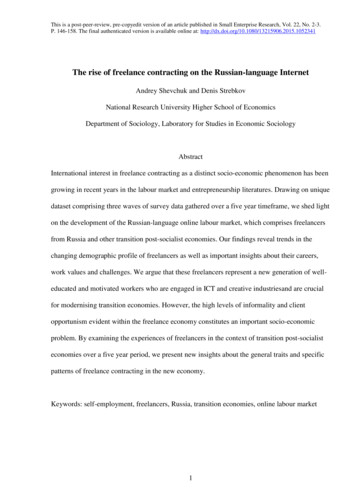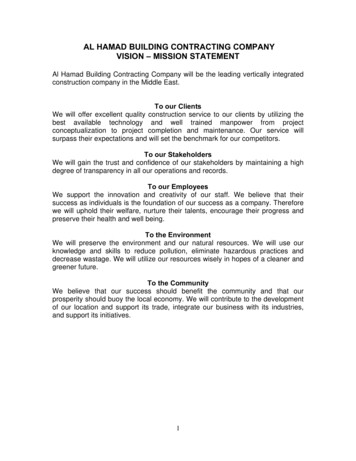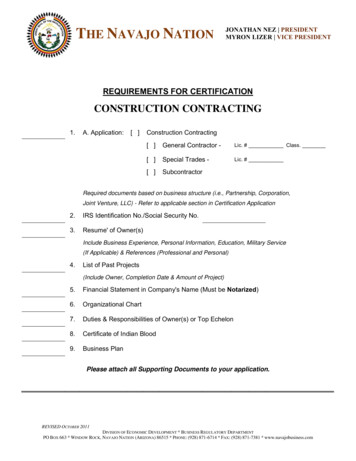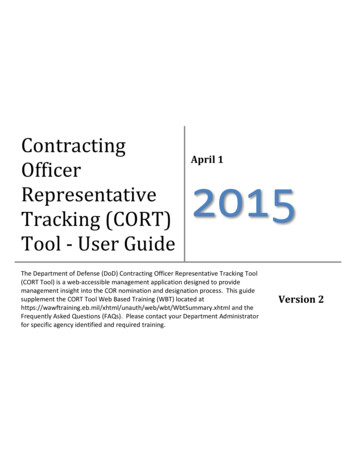
Transcription
This is a post-peer-review, pre-copyedit version of an article published in Small Enterprise Research, Vol. 22, No. 2-3.P. 146-158. The final authenticated version is available online at: http://dx.doi.org/10.1080/13215906.2015.1052341The rise of freelance contracting on the Russian-language InternetAndrey Shevchuk and Denis StrebkovNational Research University Higher School of EconomicsDepartment of Sociology, Laboratory for Studies in Economic SociologyAbstractInternational interest in freelance contracting as a distinct socio-economic phenomenon has beengrowing in recent years in the labour market and entrepreneurship literatures. Drawing on uniquedataset comprising three waves of survey data gathered over a five year timeframe, we shed lighton the development of the Russian-language online labour market, which comprises freelancersfrom Russia and other transition post-socialist economies. Our findings reveal trends in thechanging demographic profile of freelancers as well as important insights about their careers,work values and challenges. We argue that these freelancers represent a new generation of welleducated and motivated workers who are engaged in ICT and creative industriesand are crucialfor modernising transition economies. However, the high levels of informality and clientopportunism evident within the freelance economy constitutes an important socio-economicproblem. By examining the experiences of freelancers in the context of transition post-socialisteconomies over a five year period, we present new insights about the general traits and specificpatterns of freelance contracting in the new economy.Keywords: self-employment, freelancers, Russia, transition economies, online labour market1
This is a post-peer-review, pre-copyedit version of an article published in Small Enterprise Research, Vol. 22, No. 2-3.P. 146-158. The final authenticated version is available online at: roductionInternational interest in freelance contracting as a distinct socio-economic phenomenonhas been growing in recent years in the labour market and entrepreneurship literatures(Bögenhold, Heinonen, & Akola, 2014; Connelly & Gallagher, 2006; Kitching & Smallbone,2012). We define freelance contracting as an economic arrangement in which an individualpersonally delivers professional services in a market, neither working for a firm as an employeenor creating an organisation as an entrepreneur. Many other terms are used to describe thisautonomous worker such as own-account worker, independent contractor, contract professionaland consultant (Kitching & Smallbone, 2012; Osnowitz, 2010). Although these terms are oftenused interchangeably, they have different connotations within various cultural, occupational, andlegal contexts. However, the names of many dedicated websites (such as freelancer.com orelance.com) with millions of users signal the term freelancer is widely used in the new economy.Conceptually and legally, a freelancer is not engaged in an employment relationship butacts as autonomous service provider. That is why to describe a contracting party we avoid theuse of the term “employer” in favor of “client” or “customer.” We also separate freelancing fromdependent forms of contracting and self-employment (Connelly & Gallagher, 2006;Muehlberger, 2007). Different research perspectives see independent contractors and freelancerseither as a part of nonstandard externalised labour or as entrepreneurial “free agents” (Barley &Kunda, 2004). The term freelancer is typically used in conjunction with particular professionsand is not commonly used to describe material production or trading. A growing body ofliterature is exploring various types of freelancers and contract professionals across manyoccupational and institutional contexts (Barley & Kunda, 2004; Dex, Willis, Paterson, &Sheppard, 2000; Fersch, 2012; Fraser & Gold, 2001; McKeown, 2005; Osnowitz, 2010; Storey,Salaman, & Platman, 2005).2
This is a post-peer-review, pre-copyedit version of an article published in Small Enterprise Research, Vol. 22, No. 2-3.P. 146-158. The final authenticated version is available online at: ever, the extant literature on freelance contracting has some limitations. Whileindependent workers have become more involved in knowledge-intensive and creative industriesand teleworking, the traditional self-employment of small proprietors and craftsmen continues todecline (Arum & Müller, 2004). Although some studies have addressed the role of informationand communication technology (ICT) and the Internet in particular (Baines, 1999; Gold &Mustafa, 2013; Saundry, Stuart, & Antcliff, 2007), the digitisation and globalisation of freelancelabour markets in the new economy remains under-explored (Agrawal, Horton, Lacetera, &Lyons, 2013). The concept of “electronic freelancer” or “Internet freelancer” has recentlyemerged that lacks sufficient empirical enquiry (Aguinis & Lawal, 2013; Malone and Laubacher,1998). Further, much of the freelance research has been conducted in high-income countries(such as the United States of America [USA], Canada, the United Kingdom [UK], Germany,Finland, Denmark and Australia) and evidence on developing and post-socialist economies isscarce (Shevchuk & Strebkov, 2012b). Yet, the historical roots, socio-economic and culturalcontext as well as the societal impact of freelance contracting in these countries could differsubstantially.Our study aims to address these gaps by examining freelance contracting on the Russianlanguage Internet (known as the Runet). Examining the experiences of freelancers in the contextof transition post-socialist economies over a five year period may present new insights about thegeneral traits and specific patterns of freelance contracting in the new economy.Freelance contracting in the digital ageRecent improvements in ICTs have provided new opportunities for individual workautonomy while facilitating effective coordination. Many professionals who rely heavily on theirhuman capital and an affordable means of production (computer hardware and software) candeliver services to the market independently of organisational employment. Computer networksaid teleworking, namely working from a distance (usually from home) using ICT (Sullivan,3
This is a post-peer-review, pre-copyedit version of an article published in Small Enterprise Research, Vol. 22, No. 2-3.P. 146-158. The final authenticated version is available online at: 3). In the late 1990s, Malone and Laubacher (1998, p. 146) combined the notions ofindependent contracting and teleworking in a futurological portrayal of the “e-lance economy”and proposed:The fundamental unit of such an economy is not the corporation but the individual. Tasksaren’t assigned and controlled through a stable chain of management but rather arecarried out autonomously by independent contractors. These electronically connectedfreelancers – e-lancers – join together into fluid and temporary networks to produce andsell goods and services. When the job is done – after a day, a month, a year – the networkdissolves, and its members become independent agents again, circulating through theeconomy, seeking the next assignment.Inspired by the vision of Malone and Laubacher (1998), entrepreneurs foundedElance.com one year later. Elance.com was the first dedicated website that aimed to assist thematching of freelance service providers and potential buyers. This was a major landmark in thedigitisation of freelance contracting (Agrawal et al., 2013). Since then, comprehensive technicalinfrastructure for freelance contracting on the Internet has emerged, and there has beenaccelerated growth in number of online labour market participants. In contrast to the localisedtraditional markets for freelance work, online marketplaces attract workers from across theworld, permitting a type of “virtual migration” (Aneesh, 2006; Horton, 2010). For instance,Freelancer.com reported about 14 million users from 247 countries throughout 2014.Individuals, non-profit organisations, government bodies, small enterprises, and largecorporations use online marketplaces to outsource required skills. Usual areas of expertisecomprise all types of IT-related work, graphic design and multimedia, writing and editing,various business services (such as marketing, accounting and legal services) as well asengineering. Much of the work undertaken online by freelancers is also Internet-related. The4
This is a post-peer-review, pre-copyedit version of an article published in Small Enterprise Research, Vol. 22, No. 2-3.P. 146-158. The final authenticated version is available online at: ll-growing cyberspace produces ongoing demand for the development and maintenance ofwebsites, content management, search engine optimisation and related services. Along withgeneral marketplaces offering a wide range of skills such as Freelancer.com, Elance.com,oDesk.com, and Guru.com, specialised websites for designers (99designs.com) and writers(WriterAccess.com) also exist.The ideal model of electronic freelancing assumes that all stages of the business processare performed via the Internet without meeting face-to-face. These include not only locating andcommunicating with clients but also negotiating contracts, providing deliverables, and paymentarrangements. Online marketplaces seek to provide comprehensive technical and institutionalsupport for this model by facilitating the development of virtual labour markets (Agrawal et al.,2013; Aguinis & Lawal, 2013; Horton, 2010). To use the site, freelancers create professionalprofiles and portfolios. Clients post descriptions of projects for which freelancers can bid. Searchengines allow freelancers and clients to filter databases of freelancers and available projects byvarious criteria. The most recent trend in the evolution of online marketplaces is related todeveloping online collaboration tools for managing remote teams and projects in the cloudTo build reputations, websites display on-site work histories, accumulated reviews,recommendations, and client ratings. Some websites test and certify freelancers’ skills in anattempt to guarantee quality work. To protect both parties, the websites introduce escrowservices that guarantee fulfillment of contractual obligations. The websites also provide disputeassistance and arbitration. Online marketplaces can earn revenue in various ways such as throughmembership fees, ad valorem charges on contract payments and charges for additional services(Horton, 2010).There is a lack of empirical research examining freelance contracting on the Internet. Theliterature examining telework and distributed virtual teams mostly focuses on employees andorganisations. This is surprising as robust evidence suggests self-employed workers are much5
This is a post-peer-review, pre-copyedit version of an article published in Small Enterprise Research, Vol. 22, No. 2-3.P. 146-158. The final authenticated version is available online at: e involved in teleworking than employees (Ruiz & Walling, 2005). Although twocomprehensive sociological studies of freelancers and technical contractors addressed the role ofthe Internet, remote work patterns remain under-explored and online marketplaces are barelymentioned (Barley & Kunda, 2004; Osnowitz, 2010). Several studies exploring freelance onlinemarketplaces have focused on price structures, auction mechanisms and mutual selectionstrategies (Horton, 2010; Leung, 2014; Snir & Hitt, 2003). However, little is known about thecharacteristics of the individuals who work as Internet freelancers, their careers, work values andthe challenges encountered in their online relationships with clients. Researching contradictoryexperience of freelancers in online labor markets has important implications for debates aboutentrepreneurship, nonstandard work and job quality in the new economy.The distinctiveness of freelance contracting in the post-Soviet economiesAlthough dominated by English, the Internet is multilingual. A total of 71.4% of allInternet users have a native language other than English and 43.3% of all website content is notin English (Internet World Stats, 2014; W3techs, 2014). Runet is a segment of the Internet thatuses the Russian language. Citizens of the Russian Federation as well as individuals from severalcountries that were previously part of the former Soviet Union communicate in Russian. Twokey factors appear to have shaped the development of freelance contracting on the Runet: thehistorical roots of self-employment in post-Soviet countries and the delay in the development ofICT and the Internet. Although the ICT gap has been closing rapidly, the Soviet socio-economiclegacy persists.For several decades, any type of independent contracting and entrepreneurship in generalwas completely illegal in the Soviet Union. In the centrally planned Soviet economy, all peoplewere expected to work for state-owned enterprises and not for themselves. However, someindividuals managed to work on their own but only informally and part-time in addition to their6
This is a post-peer-review, pre-copyedit version of an article published in Small Enterprise Research, Vol. 22, No. 2-3.P. 146-158. The final authenticated version is available online at: n jobs. Typically, individuals did some work for households (not firms) in agriculture,construction, home care, and tutoring for children. In several other countries such as Hungaryand Poland which permitted limited forms of private economic activity during the shortersocialist period, entrepreneurial values and practices managed to survive and were mobilisedduring the market transition (Róbert & Bukodi, 2000; Szelényi, 1988). In contrast,contemporary Russia and other post-Soviet countries could not rely on strong and long-lastingtraditions of independent work. The legalisation of private entrepreneurship in the late 1980s didnot automatically lead to a large portion of the Russian population becoming involved in smallbusinesses and freelancing. The overall entrepreneurial spirit among the Russian populationremains fairly weak (Chepurenko, 2010). The self-employment rates in Russia are much lowerthan those in many developed and developing economies. For instance, own-account workerswithout employees constitute 5.6% of the labour force and all self-employed (includingemployers and contributing family workers) amount to 7.3% (ILO, 2014). Among countriesobserved in Global Entrepreneurship Monitoring (GEM), Russia continuously exhibits one of thelowest levels of entrepreneurial intentions, early-stage entrepreneurial activity and establishedbusiness ownership (Amorós & Bosma, 2014).There has also been some delay in the development of ICTs in Russia. At the turn of thenew millennium, when global online marketplaces for freelancers already existed, around 2% ofthe Russian population had access to the Internet. Recently, the total Russian-speaking Internetaudience reached 87.5 million and is ranked 7th in the world for number of Internet users,surpassing German speakers (81.1 million) and French speakers (78.9 million) (Internet WorldStats, 2014). Already the largest Internet market in Europe, the Runet still has great potential forfurther growth since the penetration rate in Russia remains low, at about 60%. Our estimatesbased on the data from The Russia Longitudinal Monitoring Survey – HSE revealed that in 20137
This is a post-peer-review, pre-copyedit version of an article published in Small Enterprise Research, Vol. 22, No. 2-3.P. 146-158. The final authenticated version is available online at: y about 42% of the Russian labour force used the Internet for their work either in theworkplace or at home.Although some attempts to establish an online infrastructure for freelance contracting hadbeen piloted earlier, the first truly successful project FL.ru (previously Free-lance.ru) waslaunched in 2005. Today, with about 1.6 million registered users, FL.ru is not only the largestfreelance marketplace in the Runet but also in Europe and one of the largest in the world.Although one website clearly dominates, around 70 freelance marketplaces operate on Runet.Six websites have in excess of 100,000 registered users and around half of the websites havefewer than 5,000 users. However, the registered user figures for websites should be treated withcaution as individuals may become inactive as freelancers over time. Nevertheless, these figuresindicate increasing interest in freelance contracting on the Internet in Russia and other postSoviet countries. Russian-language websites tend to offer less sophisticated technical andinstitutional infrastructure for freelance contracting in comparison to their global Englishlanguage counterparts. Thus we conclude that the historical roots of self-employment in Russiaand other post-Soviet countries and the initial delay in ICT make freelance contracting via theInternet an innovative social practice.Towards an understanding of freelancers on the RunetMost studies on freelancing have applied an ethnographic approach (Barley & Kunda,2004; Osnowitz, 2010), and studies using survey methods are scarce. This is not surprising,because researching freelancers quantitatively poses several methodological challenges. First,nation-wide surveys do not provide detailed information about nonstandard work arrangementssuch as freelance contracting, thus dedicated surveys are needed (Bögenhold et al., 2014;Rodgers, Horowitz, & Wuolo, 2014; Van den Born & Van Witteloostuijn, 2013). Second,freelancers are generally a relatively undefined population for whom standardised surveying8
This is a post-peer-review, pre-copyedit version of an article published in Small Enterprise Research, Vol. 22, No. 2-3.P. 146-158. The final authenticated version is available online at: hods based on probability sampling are not feasible. This issue is well recognised inemployment and entrepreneurship studies (Davidsson, 2005). Third, nonstandard workers areless accessible to researchers due to the workers’ often informal status and intermittent physicalpresence in many locations (Theodore, Valenzuela, & Meléndez, 2006). Therefore, to accountfor these methodological challenges, we used standardised online surveys with time-location(non-probability) sampling.Online surveys are appropriate for collecting data from individuals who aregeographically dispersed and use websites as a meeting place (Van Selm & Jankowski, 2006;Wright, 2006). That is the case of Internet freelancers who rely on online marketplaces for work.We assumed, regardless of whether Russian-language freelancers visit other similar websites,they tended to use the largest and the most developed infrastructure for freelance contracting onthe Runet, as represented by FL.Ru. Although some studies have used data based on transactionsprovided directly by the websites (Hong & Pavlou, 2013; Leung, 2014; Snir & Hitt, 2003), thisapproach has limitations. Website data contains a limited range of personal details and minimalsocio-demographic characteristics and is not sufficient to generate a description of thecharacteristics of Internet freelancers. Thus to generate an in-depth understanding of Runetfreelancers, we conducted an online survey on three occasions, applying the same methodologyeach time. An overview of the data collection approach and sample size is presented in Table 1.--- Insert Table 1 here ---Russian-language web questionnaires were hosted on FL.Ru. To recruit participants,administrators of the site sent registered freelancers an e-mail
elance.com) with millions of users signal the term freelancer is widely used in the new economy. Conceptually and legally, a fr











